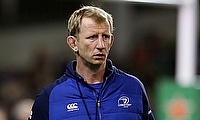Northern Hemisphere getting bashed again!
Northern hemisphere rugby has come in for a bit of a bashing again this week. Nothing new there then! Hot on the heels of Graham Henry a few weeks ago declaring England "World champions of wasting talent" due to playing "a game based on fear", his All Black coaching colleague Wayne Smith threw in his two penneth and listed 19 Kiwi fly-halves who he felt would be able to challenge for an England place. This "global export industry" of fly-halves is down to the fact that New Zealand do not have a "rugby import industry" and regulations prohibiting the signing of foreign players mean they are reliant on developing their own talent. The amazing strength in depth of young 10's that Smith feels New Zealand has was demonstrated by the five who played for the Kiwi franchises on the opening week of the Super 15. They averaged 22 years old and acquitted themselves very well.
Smith went on to say that the same situation is unlikely to arise in the English Premiership. Using Leicester's George Ford as an example, he suggested that English clubs generally would not show confidence enough in a young fly-half with huge potential to give them regular starts. Should a similar situation arise in New Zealand, where a young player is behind another in the pecking order, Smith states that the younger player would be moved to another club to get game time.
This all sounds very nice and, to a degree, I can understand where Wayne Smith is coming from. But I feel there are some glaring issues that he has chosen to ignore.
Firstly, in the English Premiership and in the French Top 14, the players aren't there to be groomed and prepared for the national team. In New Zealand, the NZRFU centrally contract the top players and then loan them out to play for the franchises. The governing body decides when the players play, when they rest and who they play for, all with an eye to ensuring that the player is fit enough, well rested enough and game-sharp enough to turn out for the All Blacks.
French and English clubs own the players contracts and therefore are rather unlikely to loan them to rival clubs to get them in shape to play for their country. Also, being contracted to a club means just that - you play for that club. Not really rocket science.
Smith has also not appeared to take what the players want into account. George Ford was recently out of contract and could have chosen to sign for any number of clubs. As the current Under 20s World Player of the Year, he would probably have been a clear first choice at most of them. He chose to stay with Leicester. Clearly he feels he can improve his game here whilst fighting with Toby Flood for a starting position. The benefits provided by good coaching, good facilities and tough competition are often more conducive to making a better player than simply starting games every week.
Then we come to the issue of the competition. It can be argued that the nature of the Super 15 makes it easier to just chuck in young players and let them find their way. There is not the shadow of relegation looming up behind the teams at the bottom, so there is no real pressure to succeed. A team can afford to lose a bunch of games if it gives their young players a chance to find their feet. They'll be better players next year and the clubs can have another go.
Over here, people's jobs and livelihoods are on the line. Relegation means a huge drop in revenue for clubs. The knock-on effect means that players suffer pay cuts or contract termination, back room staff lose their jobs and the club takes a huge financial hit that many have struggled to come back from. In this environment, there is very little room for experimentation. This may cause teams to play in fear, but it also makes for a very competitive league system. It is a very tough school to learn your rugby in, and puts players under intense pressure to perform. I would be interested to see how many of Wayne Smith's 19 fly-halves would look as good in the cold and wet mud of the English winter while they scrap for precious league points, as they do on a fast, dry hard field in the more temperate Southern Hemisphere season.
I don't feel that we are short of good, young English fly-halves. Ford is progressing well and will be pushing Toby Flood hard for the rest of this season and next. Owen Farrell started for England last week and looked composed and calm against a very good Welsh team. Despite not regularly playing 10 for his club due to the presence of Charlie Hodgson, some time spent playing outside an experienced international 10 will give him a first-hand learning opportunity. Johnny Wilkinson played his first years at Newcastle playing outside Rob Andrew, and he turned out to be a half-decent fly-half! Freddie Burns has been playing very well for Gloucester this season. He has the skills and the confidence that will see him in an England jersey at some point. Rory Clegg is also a fine prospect. Whilst he has one of the best fly-halves in the world in front of him, he has played well given the chance. These four are between 19 and 22 years old. When you throw the 26-year-old Flood, I think it's fair to say the future is far from gloomy on the fly-half front.
Credit - Dave Rogers - Getty Images








